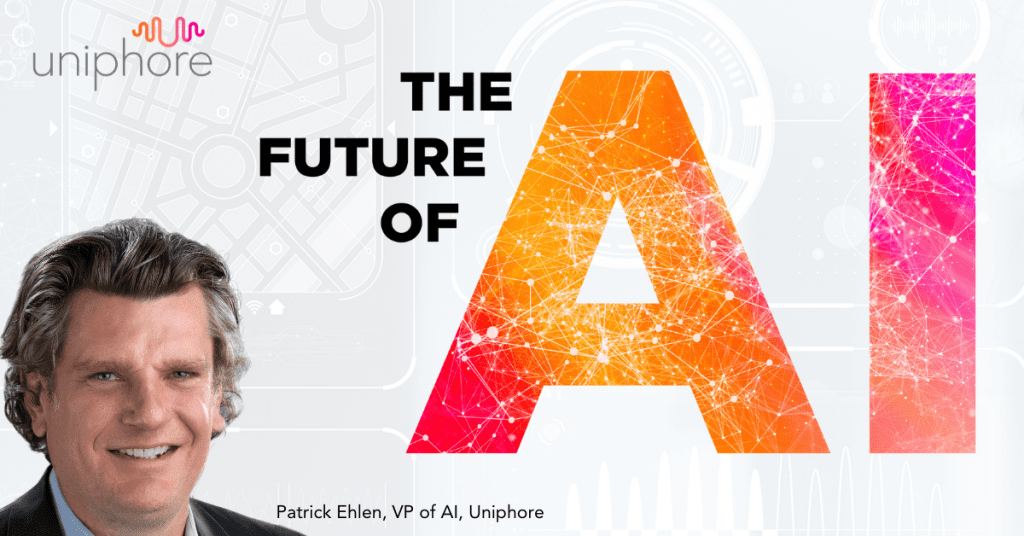
By Jody Glaser, Director of Content, Campaigns & Brand, Uniphore
There’s an intense renewed interest in artificial intelligence. Although having The Jetson’s “Rosie” in every home is still a dream, the reality of artificial intelligence might look a little different from what we imagined generations ago. AI won’t replace humans, but it is on the precipice of becoming our greatest ally. Contact center agents will work with these smart machines just as human colleagues and customers will receive new levels of care.
Uniphore is pushing the boundaries of conversational AI, using the talents, expertise and creativity of experts in the field like Vice President of AI Patrick Ehlen. He was kind enough to sit down for some questions about his background and interest in artificial intelligence and offer some advice for those interested in the field. Here’s what he had to say.
What is your role at Uniphore? And what do you spend most of your time doing?
I am the VP of AI at Uniphore. I spend most of my time doing two things: Coming up with ways to improve our existing technologies using state-of-the-art AI methods and thinking about how this company will use AI in the future to forge new paths and do things other companies are not yet doing. In general, this involves a lot of brainstorming among our talented scientists and engineers and also trying to recruit new talent in these areas to strengthen our company’s position in the AI field.
What skill sets are needed to build next-generation AI and automation systems and platforms?
Certainly, strong math and programming skills are important—especially the capacity to think statistically. But there are skills beyond that which are more important. Our company develops technologies that attempt to understand human conversation, which demands an entirely different set of abilities.
While we all feel like we’re pretty skilled at communicating in at least a language or two, our intuitions about how exactly we do that are often surprisingly misleading. Even AI practitioners who are very accomplished at doing “natural language processing” on text documents like news articles get snagged in traps when they start working with human-to-human dialogues. So when we hire new people in our group, we look for scientists who are not just good at machine learning and AI algorithms but also have knowledge of linguistics and conversation analysis, and preferably some experience doing machine learning on human-human conversations—or at least on dialogues between humans and machines, like chatbots.
To build a next-generation machine that will understand human conversation, you need to have a good balance between these two knowledge sets. Even then, there have been very talented people working on these problems for a long time. And you’ve probably noticed that a conversation with Siri or Alexa is nowhere close to the kinds of conversational AI we see imagined in science fiction, where a machine just talks to you as if it were another person. Why is that? The fact is we don’t even know what elements are missing to get us down that road to truly conversational AI.
So the most important skill of all is creativity and an impulse to think outside the box and learn and borrow from different disciplines because our current set of tools in AI is not getting us where we want to be.
How did you get interested in AI? And what has been your career path?
Career path? It never felt like I had a career path. In third grade at the library, I came across a paperback novel that had some color pictures of spaceships in the middle, and I wanted to know what it was all about. It wasn’t really a book for kids, and my teacher was impressed that I had it, so she let me read that instead of the stuff she assigned to other kids. It took the whole year. The novel was about some astronauts headed to Saturn on a spaceship equipped with an AI computer they could talk to, who then goes crazy and starts killing everybody. Maybe you saw the film, 2001: A Space Odyssey.
At the time, my dad was a self-employed econometrician and early computer enthusiast who bought a DEC PDP-11 before most people had computers in their homes, so we had this big computer in our basement that was the size of a refrigerator with blinking lights and reel-to-reel tapes whizzing back and forth like you saw in movies. No one else I knew had one of these, and after reading the novel, I thought, “There must be a way I can get this thing to have a conversation with me!” I taught myself to program in the process of trying. I was lucky to have that opportunity, though, at the time, this was not the start of any viable career path.
When I started college, I was good at programming and interested in AI, but it was the middle of an “AI winter,” and not much was going on except a seminar course where we did some LISP programming. I also stumbled across a pair of books called Parallel Distributed Processing which introduced me to the concepts of neural networks and distributed representations. This was very different from the symbolic AI going on at the time, and to me, much more exciting, so I played around with programming neural networks a little.
But “AI as a career path” was not a thing as far as I could tell, so I studied psychology to learn about the brain. In particular, I was interested in “connectionist” theories of cognition and in cognitive processing of language. I started hanging around the psycholinguistics lab in grad school and then seized an opportunity for a summer internship at Dragon Systems—one of the first speech recognition companies—followed by an internship and consulting gig at AT&T Labs working on natural language and multimodal understanding systems.
AT&T Labs was full of brilliant people talking about very complicated things I didn’t understand at the time but who were also gracious enough to spend time explaining everything to me. It was the first place I came across the nascent field of machine learning, so I guess you could say the “official” career path started there. During those few years at AT&T and then a three-year post-doc at CSLI at Stanford, the whole idea of “Wow, maybe I could actually do AI for a living!” just sort of hit me, and then it was off to the races.
Overall, I guess you could say that if there is a theme to my career path, it’s to just follow the things you find interesting and don’t worry about whether a so-called “career path” really exists (yet).
Who are the top three AI thought leaders or publications you follow?
Coming from psychology, I may be biased, but I still feel like AI can learn more from the brain than from anywhere else. One of the editors of the PDP books I mentioned above was Jay McClelland, whose papers on connectionist theories of language processing influenced me a lot as a grad student. He turned up at Stanford when I got there, along with Dan Jurafsky, Chris Manning, Herb Clark, Ivan Sag, Barbara Tversky, Chris Potts, Stanley Peters whose lab I worked in, and so many others whose work I followed.
The publications I read now are still Behavioral and Brain Sciences, Discourse Processes, Cognition, Cognitive Science, and then a slew of conferences in the ML/NLP area where I serve on program committees. Then I read a lot of online sources, like Quanta, about fun science-y stuff like quantum computing and physics and astronomy and health and medicine.
What is one thing that is not automated today that you wish was?
Going to meetings! Wouldn’t it be great if we had a digital surrogate who could attend and then report back on only the important stuff? Of course, then everyone would do that, and you’d end up with meetings of only surrogates… like at the end of Real Genius, where all the student desks are just occupied by tape recorders, and the professor’s desk has a tape recorder playing the lecture. Oh, and dusting! I think some smart person should be able to invent an autonomous drone that flies around your house sucking up dust. But I’m too busy to do it!
What do you do in your spare time?
When I have some spare time, I’m either messing around with music or reading or practicing my tennis serve, which is still horrible.
What is one book you would recommend to others? What about a movie? TV show?
I would not recommend for anyone to read “one“ book. You should read as many as possible.
Do you have a special motto or advice you like to impart to others?
I’ll punt on this one and offer these words from Emerson’s “Self-Reliance”: “In every work of genius we find our own rejected thoughts, returned to us with a certain alienated majesty.” Something along those lines.
Pushing the Boundaries of AI Language
Uniphore is bridging the gap between humans and machines by pushing the boundaries of conversational artificial intelligence. We’re exploring what makes human language so challenging and delivering next-generation conversational services powered by artificial intelligence. Thanks to people like Patrick Ehlen, Uniphore can provide the most advanced conversational automation on the planet, harnessing the power of language and the human voice.
Learn more about the state of conversational AI for the contact center in the ebook “The Future of AI for Contact Centers.”
)